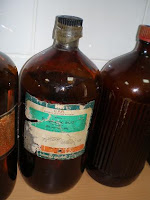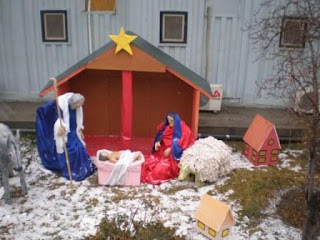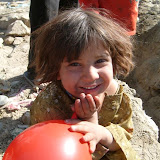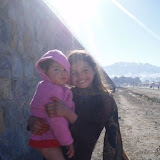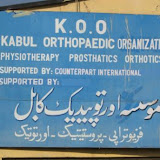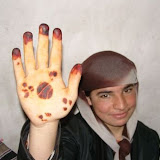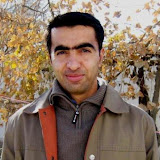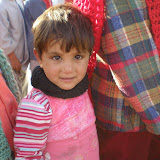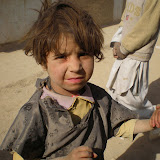-Samuel GoldwynUS (Polish-born) movie producer (1882 - 1974)
Today was an interesting day. Like I said before, the clinic has now become a hospital. When I first got to the hospital I decided to visit the inpatient ward. The beds are so close to each other that you can almost roll from one bed to another. Most of the injuries are war related. You see many fractures and leg amputations. Most of them are young guys too. I spoke with one of the patients for a while. He was telling me about how he was fighting the Taliban, alongside Americans, on the border when he received his injury. He said that they shot a rocket at him and that is how he got his leg injury. I felt sorry for him. They do not have the same luxury of disability or social security that we do in the states. They are paid a small lump sum for their injury and are left to get by the rest of their life without any additional compensation.
I headed down to the ER and I spoke with the doctor. He told me about 2 patients that were brought in last night. The police had arrested one man for robbery. When he was in custody the man's brother tried to rescue him and it resulted in both of them getting shot up pretty good. They ended up being Orthopedic patients so they were recuperating in the Otho ward. The funny part of it was that right next to the 2 criminals was a police officer that was recovering from a gunshot wound. He had shot himself while cleaning his gun. It is almost like the cops and the robbers decided to take a timeout and live in peace while they both healed. You would never see that in the states. I have been to hospitals that treat criminals and they have their own ward and the patients are usually hand cuffed to their beds. Take a look at an x-rays of one of the injuries. The fracture is pretty obvious.

I spoke with the man that was arrested and, believe it or not, he was a pretty nice guy. Of course, he said that he was set up and was wrongly accused. He was the first Afghan that I have seen with a tattoo. I thought that it was neat so I took a picture.

I went back downstairs and I went back to the ER and I saw a man with blood all over his shirt. I took a closer look and he appeared to have a big bump on his head. I asked the police officer what happened and he sort of smiled and laughed and said that the man was told to leave an area and he did not listen. They were cleaning up his head wound before they sewed it up. Another person came in with a pretty bad laceration to his chin.
I went back upstairs to visit with the OB doctor for a while. I tried really hard to teach her about fetal heart tracings. Fetal heart tracing is similar to an EKG. It is the information that the 2 monitors that are placed on pregnant ladies belly when they are in labor provide. The OB doctor told me that they do not have any monitors in all of Afghanistan (I did not independently verify this). I could tell that she was having a hard time at it so I kind of gave up because they probably will not be getting any fetal heart monitors anytime soon. One of the nurses that works in my office is a OB nurse and her husband is an OB/GYN doctor. They are mailing a bunch of OB related stuff like pregnancy wheels, paper measuring tape, and a few other OB related things. We have 6 weeks before the first baby is delivered so we are kind of under a little time pressure to get the room up and running to make the first delivery.
The horror was ubiquitous. It started the moment Kabul came into view from the window seat of the 727, a sprawling city the colour of mud and dust, bereft of the trees or blue waters I've always seen when flying over other cities. It continued when the Ariana aircraft touched ground at Kabul airport: strewn all around the runway were overturned trucks and carcasses of old airplanes, burnt fuselages, remains of wings gone to rust. Outside the terminal, amid Kalashnikov-toting military personnel, I was mobbed by beggars dressed in rags, all of them children. One of them - a frail boy of six or seven - got bullied by the others; his mud-caked hand lost its grip on the 5 afghani bill I was handing through the car window, and he let out a cry of such despair and sorrow it rang in my ears the rest of that first, terrible day.
Kabul has changed a great deal since I last saw it in 1976. The traffic is suffocating now, pedestrians, mule-drawn carts and bicycle riders weaving perilously through the clogged lanes of honking cars and taxi cabs, 3 million people roaming a 30 sq mile city designed for less than half that number. The air smells of diesel fumes and smoke from the trees people burn for firewood, and sometimes the wind-stirred dust is so thick you can't see the end of the block. The dust gets in your teeth, your eyes, your ears; everyone stops in their tracks and waits for the wind to die down. I was driven through Kabul on my second day there, a grand tour of what nearly a quarter-century of wars does to a city, to a people. As I gazed out the car window at the endless destruction blurring by, I realised that there is not a single block in Kabul that hasn't in some way been scarred by war. The so-called "posh" parts of town have dirty, unkempt homes with shattered windows, set along roads riddled with potholes big enough for a small child to lie in. The areas that bore the brunt of the mujahideen infighting - Karteh Seh, Karteh Char, Deh Mazang - have simply been flattened. They are little more than block after block of demolished homes, schools reduced to rubble, movie theatres, pharmacies and shops pulverised to piles of dirt and bricks. The crumbling Darul Aman, the old royal chateau built in the early 20th century by King Amanullah Khan, is pocked with holes from rocket attacks, standing at the end of dusty Darul Aman road like an abandoned, haunted mansion. I recall my father taking my brother and me there for picnics outside the chateau, but the flowers, trees and grass are long gone, too. Across the street, Kabul Museum is little more than a storage house for ancient artifacts that have been shattered by club-wielding Taliban.
The poverty and disarray in many areas is unspeakable. I saw an old woman wearing cracked bifocals picking slimy lettuce leaves from a fly-blown heap of trash. I saw a dead horse on the side of a crowded street and learned that it had been electrocuted when it had sipped from a rain puddle and a loose power line had touched the water. Passers-by hardly seemed to notice. One-legged war victims - some of them children - and maimed former mujahids walk the streets on canes, or just stand around leaning against walls and watching traffic, as if waiting for something. At the tomb of Ahmad Zahir, a famous Afghan singer, I stared at the bullet holes in the stone, put there by hateful Taliban who had fired with machine guns on the tomb of a man killed more than 20 years ago. "In Kabul, dying once is not enough," a young panjshiri man said to me at the grave site. As I walked away from the grave, I was mobbed again by burqa-clad women and barefoot children, their hair matted with dirt, faces oozing with sores, their teeth rotting already, begging for baksheesh. They took what I handed out and said, "May God give you plenty, Kaka! May God never make you unhappy!" The locals tell you the widows are to be pitied, but not to give money to the children, that it promotes a culture of begging. Maybe that's true, but some of these children, I learned from speaking to people, get beaten by their parents if they don't come home in the evening with a certain amount of money. On some of them, I saw the tell-tale bruises and burns. Desperation is an ugly thing. So is hunger. I don't know if handing out money to them was the right or wrong thing to do. I know only that turning from them required a strength that I simply did not find in me.
One policeman, who wanted to arrest me for videotaping him at a crowded intersection and ended up inviting me to his house for dinner (an offer which I politely declined), told me he made $40 a month to feed a family of 12: his wife, his four children, his dead brother's two wives and five children. He told me he hadn't been paid in three months and that he had borrowed money from every friend and relative he knew. He eyed the passing sleek black NGO Land Cruisers with disdain, a sentiment I found very common in Kabul, and complained that the government had given millions in aid money to the NGOs, which then spent it on fancy cars, fancy offices and fancy guesthouses. "What good are these NGOs? What have they done for us?" he said. "I have yet to see them put two bricks together." He told me the government had to find ways to put the aid money where it was most needed, in the pockets of average people. "We are thankful that the Taliban are gone and that we are safe walking the streets," he said, "but people are hungry now and they are getting desperate." He told me of a man he knew who had bought a loaf of bread, crumbled it to pieces, laced it with rat poison, and fed it to his eight children and himself. He told me of another man who, unable to feed his children any longer, had doused himself with gasoline and set himself on fire in the middle of the street. The policeman saw the shock on my face and nodded glumly. "It's true, my friend. It's all true. Tell this to the people in America."
I spoke to people on the street about life during the mujahideen infighting and Taliban rule. Mohammad Agha, a thin man with a haunted, weather-beaten face older than his stated 33 years of age, told me every home in his neighbourhood had been hit by rockets between 1992 and 1996. "My neighbour's home was hit one day, and I went into their basement. I saw a leg here, a breast there, meat everywhere." They had had to identify the victims by their clothing. His own house had been hit one day while he had been at work, and he had run home, expecting to have to dig his family's body parts out of the rubble. Instead he found his father sitting under their mulberry tree, clutching Mohammad Agha's children in his arms, all of them miraculously unharmed. "God is so great, words fail me," Mohammad Agha said to me. He told me that, one day, shortly after the mujahideen took over Kabul, he was walking by a house when he heard screaming. He knew the officer at the door from school and was able to get through. He found three young women in one room, their clothes torn off their bodies, and a mujahid soldier struggling with another woman in the living room. "He wore a ring on each finger, but there was one last ring he hadn't been able to pull off the woman's finger. So he had forced it into his mouth and he was yanking the ring off with his teeth, blood dripping from his mouth, tearing the meat off the woman's finger." He shook his head and told me that was one of the worst things he had ever seen in his life. "And I've seen people nailed in the head, cut in half with saws, their eyes gouged out with bare hands," he added. He told me how the mujahid forces in the mountains used people for target shooting: that they would bet 1,000 afghanis for a pedestrian, 2,000 for a bicycle rider, 3,000 for a car. 1,000 afghanis is $20. "You know the worst part?" he asked. "Some of those people are now working for the government, driving fancy cars." I spoke to my driver, Awdi Khan, a plump, kind-faced man in his late 40s. I told him that some people in America whisper that the reports of the atrocities committed by the Taliban are exaggerated. He scoffed at this. "Then they should have been here with us," he said. "There were executions every Friday or every other Friday; certainly hand-cutting every week. They would announce it on TV on Wednesdays: 'So-and-so, son of so-and-so, from so-and-so area, will be put to death for this or that crime.' The hands ... " he paused, " ... they would tie to a ring and parade them in front of the people at Ghazi Stadium." He told me how he sometimes had to pray midday namaz three or four times. "You would be walking down the street and some Talib would tell you to go to the mosque to pray. You would swear to him that you had just prayed, but he would hit you with a whip and call you a liar. You'd pray once more, then cross the street, and get stopped again."
But here is the most amazing thing of all: amid the despair, sickness and destitution, I saw beauty and kindness that brought me to my knees. And I saw what I had come to Afghanistan to see: signs of rebirth and hope, signs of a people allowing themselves to dream again. I saw men planting grapevines and trees on the hill that leads to Bagh-e-bala, King Abdur Rahman Khan's old palace, which overlooks the city. I chatted with a young shepherd playing the flute on that hill, the bells on his sheep jingling as they fed on grass. He thought his life was much better since the Taliban had been largely ousted - he could play his flute again. Children flew kites from rooftops and young men in pirhan-tumban played volleyball at the Shar- e-nau Park. People smiled and little schoolgirls sang songs as they skipped to school, holding hands. I saw people painting old homes, building new ones, digging gutters, going to the movies and playing Bollywood soundtrack songs and rubab music at street corners. Kebab-makers fanned skewered lamb on charcoal flames and, more than once, offered me free meals. Awdi Khan took me to a section of Kabul river that people had turned into a bazaar. "Afghan people make do with what they have been given," he said. The droughts had dried the river, so people had set up shops in its empty bed, selling carpets, clothes and cheap jewellery. "They call it Titanic City," he said. It rained for the first time in years while I was there, and within days the river was flowing once more. "No more Titanic City," Awdi Khan said, smiling, "but people are happy. We need water for the trees and the wells. We need Kabul to be green again." Kabulis love flowers once more. They buy them from stores and place them on the windowsills of their broken homes, sometimes planting them in the empty shells of old mujahid rockets - Rocket Flowers, they call them. They deck out their cars with pink flowers and white ribbons on wedding days, driving and honking through Chicken Street past muddy ISAF jeeps. Despite the squalor around them, Afghan dignity has managed to survive. I tried to hand a young boy money once at Koteh Sangi. He shook his head and said, "I am not a beggar, Kaka." Then he invited me over to tea at his house. The "house" turned out to be three and a half crumbling, roofless walls with a wrecking-ball-sized gaping hole in the middle of one.
I have returned to my own life now in America, a life whose even minor conveniences suddenly strike me as decadent. I have had a few days to reflect on my return to Afghanistan, as I drive around town, as I stand in line at the grocery store, as I lie in bed at night, my two children sleeping safely down the hallway. The enormity of what has happened in my homeland is overwhelming, but what comes back to me is not the poverty, the destruction, the aftermath of years of violence. Nor is it the nostalgic satisfaction of seeing once again my father's house in Wazi Akbar Khan where I grew up, or Istiqlal, my old school, or Cinema Park where my brother and I saw so many old westerns; all of these settings I used for my novel The Kite Runner. No. What I think of mostly is the people I met, their faces, their names, their smiles. I think of the stories they so generously shared with me, and how they have managed to survive in the face of what has happened in that land, how they have salvaged their dignity, their dreams and hopes. How they have stayed kind. I think of the strength of the Afghan people. I think of their humility. Their astonishing grace.
Thanks for reading.
























